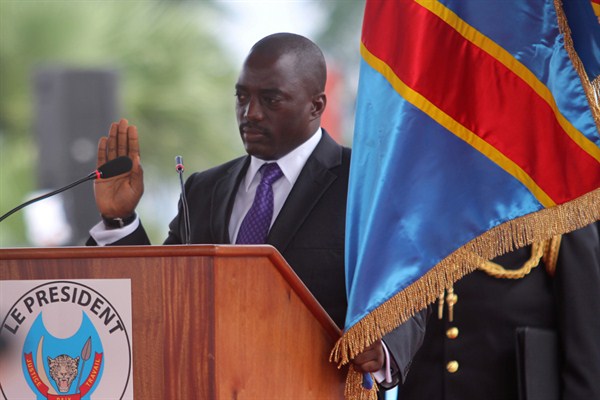For Africa’s so-called presidents for life, bypassing term limits meant to ensure the peaceful, democratic transfer of power has long been business as usual. But as recent articles in World Politics Review show, presidential term limits have now become a frontline issue in Burundi, the Democratic Republic of Congo, Togo and Burkina Faso.
For the next two weeks, all of the articles linked below are free for non-subscribers.
Burundi
Tensions in Burundi ahead of next month’s elections flared up this week after a Constitutional Court ruling cleared the way for a potential third term for President Pierre Nkurunziza.
Burundi Tensions Rise After Court Backs President’s Third Term Bid
Jonathan W. Rosen described this week how protesters are refusing to back down, amid an already violent situation that could easily escalate. He notes that the country’s historical ethnic divisions are receding before political cleavages, as both Hutu and Tutsi young people increasingly blame Nkurunziza for a lack of economic opportunity.
In January, Cara E. Jones predicted that Nkurunziza’s CNDD-FDD party would likely prevail in the upcoming elections, but at the high cost of violence and instability.
In an interview last year, Stef Vandeginste laid out how Burundi’s stability depends on a delicate power-sharing arrangement within the army leadership, and how that arrangement is increasingly threatened.
Democratic Republic of Congo
In the Democratic Republic of Congo, President Joseph Kabila inherited the presidency from his assassinated father in 2001, before going on to win elections in 2006 and 2011. Many suspect he will seek a third term, despite the fact that Congo’s constitution forbids it.
As Richard Downie wrote last October, “all the signs suggest that Kabila is willing to ignore his critics and railroad the opposition into bowing to his wish to dismantle the DRC’s constitution for the sake of his personal ambitions. If he succeeds, he will join a growing list of African leaders whose defiance of democratic principles and their nations’ own laws are turning them into presidents for life.”
In a feature article in February, Jason Stearns argued that the constitutional crisis surrounding a potential third term for Kabila now trumps violence in the country’s war-torn east as the biggest threat to Congo’s stability. The international community, however, has been slow to recognize this change.
Togo
Another country struggling with similar issues is the small West African nation of Togo, where President Faure Gnassingbe won re-election to a controversial third five-year term late last month, but faces continuing opposition despite the Constitutional Court’s validation of the final results.
In March, Kamissa Camara wrote about how the opposition tried to hold Gnassingbe to a two-term limit, but was outmaneuvered, thanks in part to its own internal leadership struggles.
Burkina Faso
Not all “presidents for life” make it that far. On Oct. 30, 2014, Burkina Faso’s President Blaise Compaore, who first took power in 1987, was forced out of office by mass demonstrations after attempting to remove presidential term limits.
Days after the ouster, Alex Thurston presciently wrote that Compaore’s fall indicated that “2015 will be a year of contentious politics in several sub-Saharan African countries where pre-existing tensions will intersect with elections.”
In February, Kamissa Camara explained how even with Compaore out of power, the military’s continuing role in politics has made a true democratic transition difficult.
Last month, Ernest Harsch described Burkina Faso’s halting progress toward reforming the electoral system and reining in corruption—a reminder that overthrowing a president for life is only the first step toward overcoming a troubled legacy.
Related

